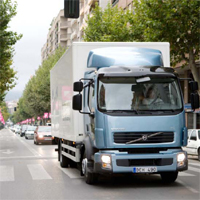CityLog, Towards New Solutions for Urban Freight Distribution
Abstract
Recently urban freight transport has become an important social issue in terms of the increasing level of traffic congestion, negative impacts on the environment, traffic safety and accidents as well energy consumption. The situation is getting worse by currents trends in supply chain organisation (e.g. just in time delivery, fragmentation of loads) which have led to an exponential increase in the number of freight emissions, especially for small parcels that are often carried by empty transport vehicles. The EU policy and legislation relevant to urban mobility has been developed with significant funding provided through several programmes (FP, INTERREG, LIFE, URBAN, CIVITAS, URBAN etc.). The CityLog project – co-funded within FP7 and with 18 European partners coordinated by Centro Ricerche Fiat – aims at increasing the sustainability and the efficiency of urban delivery of goods through an adaptive and integrated mission management and innovative vehicle solutions. Three action domains have been identified to improve today’s city logistic system: • logistic-oriented telematic services are expected to give a decisive contribution to improve mission planning processes through an optimized routing and drivers’ support systems. Towards the final customers, tracking and communication capabilities should be deployed to reduce the number of unsuccessful deliveries; • vehicle technologies will represent a key factor to increase the operational flexibility of lorries and vans. It means that the vehicles shall be requested to support different mission profiles, and this will allow to reduce their number. In other words, what should be achieved is the interoperability among the vehicles, especially in terms of load unit handling; • innovative load units shall be carefully designed to operate, like the vehicles, in different missions. Therefore, a re-configurable internal layout will enable different uses either as simple container or mobile pack station (BentoBox concept). In the latter case, the goal is the de-synchronization of the delivery process between operators and final customers in order to reduce the unsuccessful deliveries. The innovative approach of CityLog will lead to decrease the number and optimise the use of delivery trucks in urban areas, while bringing an increased quality of services. From the logistics operator point of view the groundbreaking CityLog solutions and technologies are of highest interest due to the increased energy efficiency and quality of services. Concerning the perspectives, the conference on the Future of Transport organized by the European Commission in March 2009 rightly identified the urban context as one of the main challenges to transport policies in terms of both sustainability (CO2, air pollution) and competitiveness (congestion). This will have an impact on the design of the transport system as a whole, and the urban context will increasingly serve as a “laboratory” for the transport sector in the years to come; a testing ground for the development of new technological and financial solutions.Downloads
References
Allen J., Thorne G., Browne M. (2007) “BESTUFS, Buone Pratiche di Trasporto Merci in Ambito Urbano”, http://www.bestufs.net/ gp_guide.html
Atti della Conferenza sul futuro del trasporto. Bruxelles, 9-10 marzo 2009, http://ec.europa.eu/transport/strategies/events/ 2009_03_09_future_of_transport_en.htm
AA.VV. (2006) “WATCH-OVER Requirements and Use Cases”, http://www.watchover-eu.org/download/WATCHOVER_ D2.1_Requirements_and_use_cases.pdf
Dalla Chiara B. (2010) Telematica per i trasporti – Tecnologie di base della telematica per i trasporti, con approfondimento di metodi ed applicazioni, Egaf, Forlì
Giuntini A., Pavese C. (2004) Reti, mobilità, trasporti. Il sistema italiano tra prospettiva storica e innovazione, Franco Angeli, Milano
Zotteri G., Brandimarte P., Cambini C. (2009) Studio sulla Logistica Urbana in Piemonte.

Copyright (c) 2014 Tema. Journal of Land Use, Mobility and Environment

This work is licensed under a Creative Commons Attribution 4.0 International License.
Authors who publish in this journal agree to the following:
1. Authors retain the rights to their work and give in to the journal the right of first publication of the work simultaneously licensed under a Creative Commons License - Attribution that allows others to share the work indicating the authorship and the initial publication in this journal.
2. Authors can adhere to other agreements of non-exclusive license for the distribution of the published version of the work (ex. To deposit it in an institutional repository or to publish it in a monography), provided to indicate that the document was first published in this journal.
3. Authors can distribute their work online (ex. In institutional repositories or in their website) prior to and during the submission process, as it can lead to productive exchanges and it can increase the quotations of the published work (See The Effect of Open Access)
